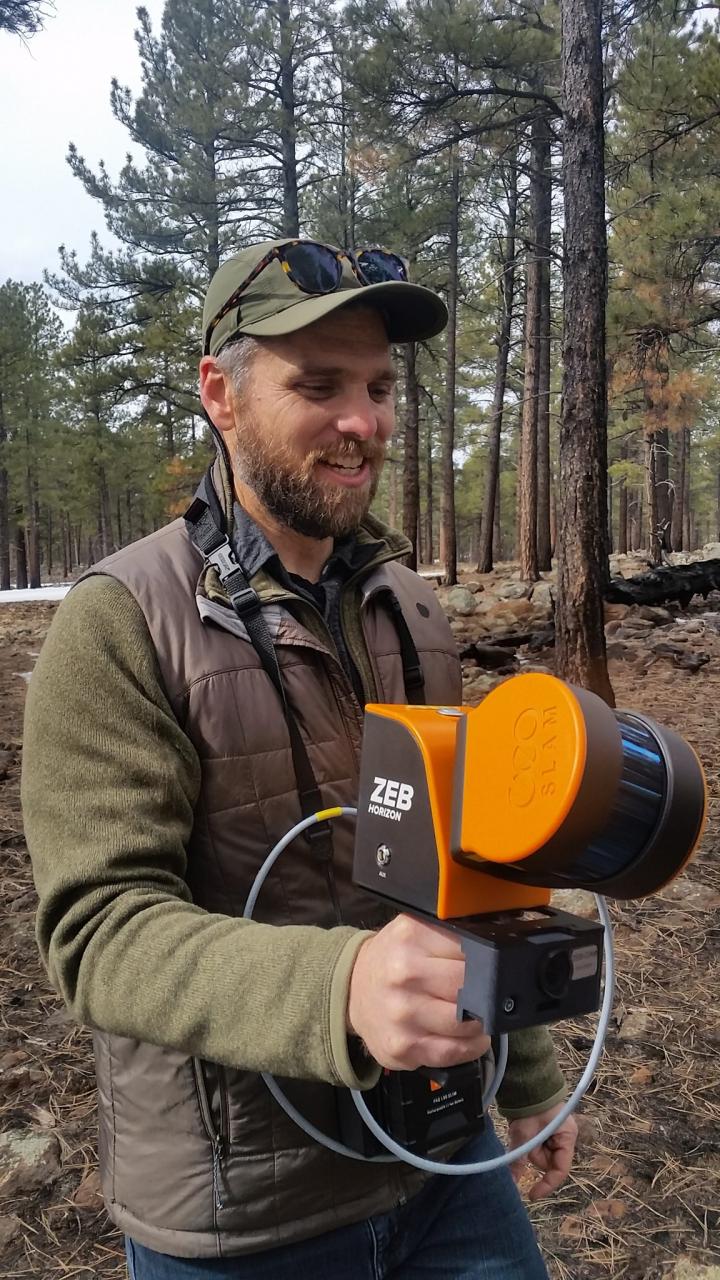Findings suggest mobile platforms have great potential for monitoring a variety of forest attributes

Credit: Northern Arizona University
As light detection and ranging (lidar) technology evolves, forest ecology and ecological restoration researchers have been using these tools in a wide range of applications.
“We needed an accounting of relative accuracy and errors among lidar platforms within a range of forest types and structural configurations,” said associate professor Andrew Sánchez Meador, executive director of NAU’s Ecological Restoration Institute (ERI).
Sánchez Meador led a study recently published in Remote Sensing, “Adjudicating Perspectives on Forest Structure: How Do Airborne, Terrestrial, and Mobile Lidar-Derived Estimates Compare?.” The study compared vegetation attributes at multiple scales derived from piloted airborne (ALS), fixed-location terrestrial (TLS) and mobile lidar scanning (MLS) to see how these tools might be used to provide detailed information on forest structure and composition. The researchers, including postdoctoral scholar Jonathon Donager and PhD student Ryan Blackburn, both of ERI and NAU’s School of Forestry, found MLS consistently provided accurate structural metrics and can produce accurate estimates of canopy cover and landscape metrics.
“Our findings suggest that MLS has great potential for monitoring a variety of forest attributes,” Sánchez Meador said. “These types of scanners cost a fraction of that of other platforms, work equally well indoors and outdoors, are easily deployed and view the forest the same way humans do – from down among the trees – which makes communicating research findings easier.”
“As the technology develops further and prices continue to come down,” he said, “we expect to see more researchers and managers using these tools for all sorts of applications, from monitoring the effects disturbance events such as fire and flood, to quantifying vital wildlife habitat, to providing baseline data for virtual reality applications and simulation modeling.”
As a result of this work, Sánchez Meador and David Huffman, ERI director of research and development, secured funding from the Phoenix-based Salt River Project (SRP) to examine the ability of MLS to rapidly assess forest structural conditions in mixed-conifer forests and the amount and distribution of coarse woody debris, an important component of forest ecosystems.
This research was made possible through funding from NAU’s Research Equipment Acquisition Program (REAP), which enabled ERI to purchase a handheld MLS device. This project shows how investment in technology and equipment through the REAP program can be leveraged to support broader, multiple research goals and promote partnerships with companies like SRP.
As ERI’s executive director, Sánchez Meador works to advance the institute’s focus on restoring western forest landscapes using innovative technologies, service to Native American tribes, promoting novel solutions for the use of tree biomass and wood products and actively engaging with the people and communities that influence land management and depend on these forests.
###
About Northern Arizona University
Northern Arizona University is a higher-research institution providing exceptional educational opportunities in Arizona and beyond. NAU delivers a student-centered experience to its nearly 30,000 students in Flagstaff, statewide and online through rigorous academic programs in a supportive, inclusive and diverse environment. Dedicated, world-renowned faculty help ensure students achieve academic excellence, experience personal growth, have meaningful research opportunities and are positioned for personal and professional success.
Media Contact
Tayloe Dubay
[email protected]
Related Journal Article
http://dx.




